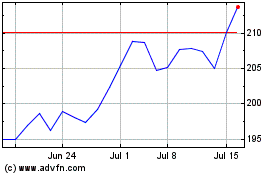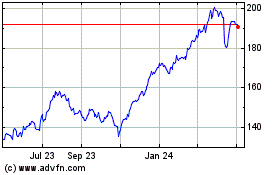Big Banks Reshape Lobbying Game
July 16 2018 - 5:59AM
Dow Jones News
By Lalita Clozel
Big banks are revamping their lobbying approach as
Trump-appointed regulators set out to ease rules put in place after
the financial crisis.
On Monday, two trade groups representing some of the largest
banks, including JPMorgan Chase & Co., Bank of America Corp.
and Citigroup Inc., will join forces to seek regulatory relief for
an industry that remains tainted by the 2008 crash and more recent
sales-practice scandals at Wells Fargo & Co.
The new Bank Policy Institute -- merging the Clearing House and
Financial Services Roundtable -- will represent 48 of the largest
banks, a group that notched a limited win in the banking bill
signed by President Donald Trump in May, which was more focused on
regulatory relief for medium to small banks.
"The safety and soundness of banks can be maintained while
fostering an ability to drive growth in all sectors of the
economy," said SunTrust Chief Executive William Rogers Jr. "We want
to make that statement in the strongest way possible."
Big banks, which have largely accepted the postcrisis order put
in place by the 2010 Dodd-Frank financial law, aren't asking for a
wholesale rollback of the regulatory regime.
Instead, they are working to influence the paring down of those
rules by a set of receptive regulators.
"Postcrisis regulation wasn't built in a day," said Greg Baer,
the group's CEO. "I don't think a thoughtful reconsideration of it
can take place in a day."
The new lobbying group will crank out studies and nitty-gritty
regulatory analysis in its efforts to influence policy makers. It
will also seek to expand its focus beyond the U.S., convening chief
executives of major international banks twice a year to discuss
global regulatory coordination issues.
Across the street from the Bank Policy Institute in downtown
Washington, a smaller organization called the Financial Services
Forum, which represents eight Wall Street powerhouses, is also
shaking off the cobwebs and staffing up. In April, it hired Sean
Campbell, a former high-ranking Fed economist, to lead its policy
research.
The forum will "ensure that these largest institutions have a
voice in the policy space that ensures that its views are properly
represented," said its president and CEO Kevin Fromer, a former
Treasury official under President George W. Bush.
The lobbying push is up against a drumbeat of criticism the
industry continues to receive from politicians such as Sen.
Elizabeth Warren (D., Mass.), who argue that easing regulation
could increase financial risk at a time when the industry is
already posting record profits.
"There still is a hangover with some parts of the public from
the financial crisis and there still is a hangover politically,"
said Edward Yingling, the former head of the American Bankers
Association.
The new lobbying apparatus, an effort to cut redundancies among
bank trade groups, will also have to manage competing interests
between its members especially at the granular level of detail that
characterizes rulemaking.
In separate June letters to the Federal Reserve, Bank of America
and JPMorgan openly disagreed on how the central bank should
calculate a key capital requirement.
JPMorgan, Citigroup, Bank of America and Wells Fargo will carry
more weight than the other members, holding permanent seats on the
rotating 17-member Bank Policy Institute board.
"While there's a large degree of commonalities between banks,"
Mr. Baer said, "How regulations get calibrated may mean one bank
gets a better deal than another."
Write to Lalita Clozel at lalita.clozel.@wsj.com
(END) Dow Jones Newswires
July 16, 2018 05:44 ET (09:44 GMT)
Copyright (c) 2018 Dow Jones & Company, Inc.
JP Morgan Chase (NYSE:JPM)
Historical Stock Chart
From Mar 2024 to Apr 2024

JP Morgan Chase (NYSE:JPM)
Historical Stock Chart
From Apr 2023 to Apr 2024
